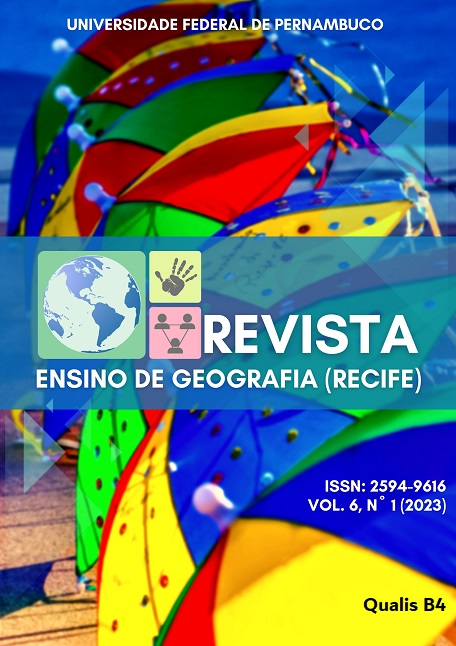Characterization of high school classes as a support for planning teaching practice
DOI:
https://doi.org/10.51359/2594-9616.2023.255969Keywords:
class diagnosis, information and communication technology, teaching geographyAbstract
This article aims to characterize the high school evening classes of the Escola de Educação Básica Padre João Stolte located in the city of Botuverá/SC in order to develop a diagnosis to contribute to the planning of teaching practice. The bibliographic research was carried out in order to understand the role of the use of information and communication technologies in the school environment. For data collection, initially a semi-structured questionnaire was used to outline a profile of high school students at night and, then, an attempt was made to investigate students' interests in studies as well as their relationship with information and communication technologies. After the application of the questionnaire, the data were tabulated with the help of Excel and presented in the discussions of this article. It was concluded that the target audience of this research has access and connects with the digital world in their daily lives, making it viable to use technological tools as potential support in the teaching and learning process. The characterization presented will serve as support for the elaboration of future lesson plans that contemplate the use of information technologies and the interests of the students identified in this research.References
BRASIL. Ministério da Educação. Base Nacional Comum Curricular. Brasília, 2017.
CASTELLAR, Sônia; VILHENA, Jerusa. Ensino de geografia. São Paulo: Cengage Learning, 2010.
G1 GLOBO. Brasileiro é um dos campeões em tempo conectado na internet. Globo.com, 2018. Disponível em: https://g1.globo.com/especial-publicitario/em-movimento/noticia/2018/10/22/brasileiro-e-um-dos-campeoes-em-tempo-conectado-na-internet.ghtml. Acesso em: 08 jul 2022.
IBGE – INSTITUTO BRASILEIRO DE GEOGRAFIA E ESTATÍSTICAS. IBGE Cidades. Botuverá. Disponível em: https://cidades.ibge.gov.br/brasil/sc/botuvera/panorama. Acesso em: 08 jul 2022.
LÉVY, Pierre. Cibercultura. São Paulo: Editora 34, 2005.
LÉVY, Pierre. As tecnologias da inteligência. In: O futuro do pensamento da era da informática. Rio de Janeiro: Editora 34, 1993.
MORAN, José Manuel. Ensino e aprendizagem inovadores com Tecnologias audiovisuais e telemáticas. In: MORAN, José Manuel.
MASETTO, Marcos Tarciso. BEHRENS, Marilda Aparecida. Novas tecnologias e mediação pedagógica. Campinas, SP: Papirus, 2000. p. 11-65.
PONTE, J.P. Tecnologias de informação e comunicação na formação de professores: Que desafios? Revista Iberoamericana de Educación, 24, 63-90, 2000.
PONTUSCHKA, N. N. PAGANELLI, T. CACETE, N. H. (Orgs). Para ensinar e aprender Geografia. 3. ed. São Paulo: Cortez, 2009. 383p.
PESSOA, Jomara Dantas. O ensino de geografia e as Tecnologias da Informação e Comunicação: Uma Proposta de Formação Docente na Modalidade de Ensino à Distância. Curitiba, 2011. Monografia (Especialista em Educação a Distância). Programa de Pós-Graduação e Pesquisa, Universidade Federal do Paraná. Disponível em: http://acervodigital.ufpr.br/bitstream/handle/1884/33040/JOMARA%20DANTAS%20PESSOA.pdf?sequence=1&isAllowed=y> Acesso em 09 mar 2022.
PACHECO, Ana Paula. O uso de tecnologia da informação e comunicação no ensino e Aprendizagem de geografia: uma proposta de formação Continuada. João Pessoa, 2019. Tese (Doutorado em Geografia). Programa de Pós-Graduação em Geografia da Universidade Federal da Paraíba. Disponível em: https://repositorio.ufpb.br/jspui/handle/123456789/18779 Acesso em 10 mai 2022.
Downloads
Published
How to Cite
Issue
Section
License
Copyright (c) 2023 João Leonir Mantovani

This work is licensed under a Creative Commons Attribution 4.0 International License.
Authors who publish with this journal agree to the following terms:- Authors retain copyright and grant the REVISTA ENSINO DE GEOGRAFIA (RECIFE) right of first publication with the work simultaneously licensed under a Creative Commons Attribution NonCommercial International 4.0 (CC BY-NC) that allows others to share the work with an acknowledgement of the work's authorship and initial publication in this journal.
- Authors are able to enter into separate, additional contractual arrangements for the non-exclusive distribution of the journal's published version of the work (e.g., post it to an institutional repository or publish it in a book), with an acknowledgement of its initial publication in this journal.
- Authors are permitted and encouraged to post their work online (e.g., in institutional repositories or on their website) prior to and during the submission process, as it can lead to productive exchanges, as well as earlier and greater citation of published work.



